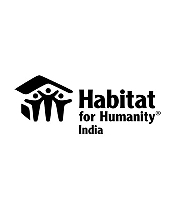
|

|
|
022-67846868 www.habitatindia.org bhagyashreek@hfhindia.org |
| Project Name | Building School Sanitation & Solar System | |||||||||
| Amount Utilized (INR) | 4138547 | |||||||||
| Project Description | Location: Khed - Pune district, Maharashtra State. Habitat for Humanity India Built 2 School Sanitation to Support over 1,000 Students to get better Sanitation Facilities at School. This particular Project helped students to have better access to sanitation facilities thus helping them maintaining the Health Management In addition, we built 5 School Solar Unit Systems to support over 2,000 students to get electricity to run tube lights, fans, and other electronic equipment. Further to the above we are also continuing the holistic development of Khed area in Maharashtra. In total we were able to support 7 Schools/3,000 Students to have better place to study. | |||||||||
| Locations | Pune > Maharashtra (MH) | |||||||||
| Causes | Education > School Infrastructure,Health > Sanitation & hygiene | |||||||||
| Beneficiary Group | Children | |||||||||
| Beneficiary Description | Location: Khed - Pune district, Maharashtra State. Habitat for Humanity India Built 2 School Sanitation to Support over 1,000 Students to get better Sanitation Facilities at School. This particular Project helped students to have better access to sanitation facilities thus helping them maintaining the Health Management In addition, we built 5 School Solar Unit Systems to support over 2,000 students to get electricity to run tube lights, fans, and other electronic equipment. Further to the above we are also continuing the holistic development of Khed area in Maharashtra. In total we were able to support 7 Schools/3,000 Students to have better place to study. | |||||||||
| Impact | A child spends his/her maximum time in school as a student. The school infrastructure then becomes a major factor behind how a child sees the world as he/she grows up. Schools, being the second home, serve a number of purposes in a child's life. From boosting their confidence to making them learn the importance of team work and socialisation, schools do it all. Away from home, schools become the place for children to spend their maximum time. For this same reason, investments in school infrastructure have an essential role in solving access problems of students to the school system and to improve their performance. Through these projects by giving better school sanitation and solar system, we were able to see the improvements in attendance, better health and sense of health safety | |||||||||
Activities Conducted
| ||||||||||
| Project Name | IN23414 - Waterwheel distribution for the selected marginalized families | ||||||
| Amount Utilized (INR) | 499650 | ||||||
| Project Description | - An emerging threat to water quality is due to the use of persistent organic pollutants (POPs). These are chemicals that degrade very slowly and remain in the environment for years. - Another concern is the fetching of water. Women and girl children fetch water for household use in rural areas. Often this keeps them from attending school or working at a job. The average distance that women and children walk for water is six kilometers (3.7 miles). Women carry heavy loads of water (about 20 litres) on their heads. - On average, a rural woman walks more than 14,000 km a year just to fetch water. On average, the required total number of pots/buckets in a family is about 3 pots i.e. 30-45 liters (one pot of 10-15 liters per trip). | ||||||
| Locations | Baran > Rajasthan (RJ) | ||||||
| Causes | Health > Sanitation & hygiene | ||||||
| Beneficiary Group | Children,Women,Elderly,LGBTQAI,Persons with Disabilities,Tribal community,Others | ||||||
| Beneficiary Description | Waterwheel distribution for the selected marginalized families. | ||||||
| Impact | - The water wheel does not only solve the problem of carrying a heavy load but also helps in reducing the number of trips required for the required household water needs. In one trip using a water wheel, a larger quantity of water (around 45 liters) is transported to the destination. It is an economical alternative that not only saves time and energy but also saves an individual from physical health hazards. | ||||||
Activities Conducted
| |||||||
| Project Name | IN23813 - Culver Max Entertainment Private Limited - Infrastructural Development in Schools | ||||||
| Amount Utilized (INR) | 2617750 | ||||||
| Project Description | Khed taluka is a subdivision near Pune city in the Pune district of the state of Maharashtra, India. It comprises about 191 villages. The population of Khed is mostly composed of Schedule Tribe families who depend on agricultural activities for their livelihood. Although they own land, they reside in small thatched houses with mud walls that are in dilapidated condition. The families living in the village work as landless farm labourers or work on small patches of land they own. They earn an average daily income of around INR 166, which is insufficient to meet even their basic needs. The living conditions of these farmers are inadequate, and they lack access to education and healthcare. It is a fact that having schools in good conditions is decisive for students to achieve the expected academic results. The conditions of the schools directly impact the performance of the students. Good school infrastructure, with renewed spaces, makes it possible for children and youths that live in remote areas to study and, in addition, tends to improve the attendance and interest of students and teachers in learning. | ||||||
| Locations | Pune > Maharashtra (MH) | ||||||
| Causes | Health > Sanitation & hygiene | ||||||
| Beneficiary Group | Children,Women,Elderly,LGBTQAI,Persons with Disabilities,Tribal community,Others | ||||||
| Beneficiary Description | 1. Z.P. School, Kadadhe – 51 students from school and 24 students from ICDS Anganwadi Total students - 75 2. Z.P. School, Kalechi Wadi – 26 students and 23 students from ICDS Anganwadi Total students – 49 3. Sidheshwar Vidhyalay, Kadadhe Total student s- 167 | ||||||
| Impact | Completed , Need assessment and orientation of school authorities and meetings in the month of November to Dec.2023. Solar installation completed in two schools (Z.P.School, Kadade and Sidheshwar Vidyalay, Kadade) Constructed new sanitation unit for Boys & Girls separately in the school of Kadade and Kalechiwadi Installation of computer, UPS and Printer in Z.P.School, Kadade Done Technical audit & Certification -External consultant for the sanitation unit of Z.P.School, Kadade and Kalechewadi Total 291 students covered from three schools and covered 163 boys and 128 girls. | ||||||
Activities Conducted
| |||||||
| Project Name | Stay at school | ||||||
| Amount Utilized (INR) | 597968 | ||||||
| Project Description | Every year, 23 million girls in India drop out of school after reaching puberty. Right after their first period, young girls from rural and urban communities struggle to maintain regular attendance at school due to problems that come with menstruation. Absence of toilets, lack of access to sanitary pads and lack of education on menstrual hygiene are the contributing reasons for this high rate of drop out. It is time to break free of shame and constraints attached to menstruation. When you campaign for Stay at School, you will help girls from less fortunate communities in India break free from constraints of menstruation and ensure uninterrupted learning at school by raising funds to: i. Provide access to health and hygiene kits consisting of sanitary pads, ii. Counseling on menstruation, and iii. Build gender segregated sanitation units Watch the Stay at School video – https://youtu.be/sPl2U4ENdbU | ||||||
| Locations | Pan India | ||||||
| Causes | Health > Sanitation & hygiene | ||||||
| Beneficiary Group | Children,Women,Elderly,LGBTQAI,Persons with Disabilities,Tribal community,Others | ||||||
| Beneficiary Description | handed over sanitation units to 12 families and 2 schools in the villages of Khed , Pune | ||||||
| Impact | built school sanitation blocks in habitat's operational states where we are present and working towards stay at school campaign. | ||||||
Activities Conducted
| |||||||
